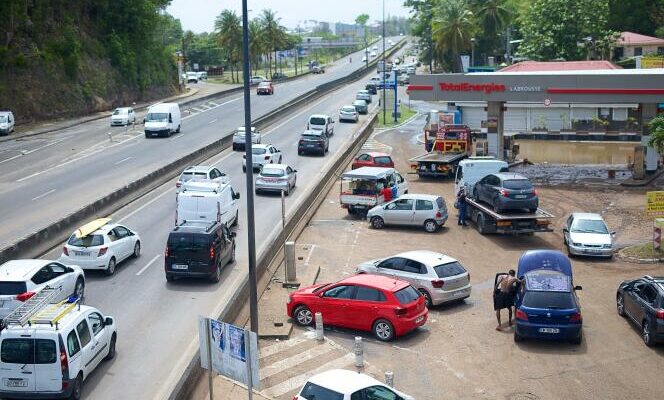Infrequent bus stops, sometimes unmarked, absence of a counter at the bus station terminal to inform passengers… In Guadeloupe, traveling by public transport can be a real obstacle course. To go from one town to another, you have to take several buses, buy several tickets and the travel time remains long. Unless you take one of the lines of the still recent interurban service. There, tickets are purchased upon boarding, with change.
But this interurban service is still a little discreet: installed in November 2022, it connects the municipalities in the two main islands of the Guadeloupe archipelago, Basse-Terre and Grande-Terre. “I regularly take these journeys to return to Pointe-à-Pitre, but also the intercommunal transport of Sud Basse-Terre, and the two are not linked”, says Kamille (first name has been changed), 17 years old. Like many residents, she plans to acquire a car and make it her main mode of transportation. Despite the importance of the traffic jams which clog the roads of Guadeloupe on a daily basis, and not only during rush hours.
The car reigns supreme: 72% of trips are made by car, compared to 63% nationally. A figure which has increased over time, with a constantly growing fleet. According to the National Institute of Statistics and Economic Studies (Insee), 230,000 vehicles were in circulation on 1er January 2021, compared to 219,000 in 2019, and 194,000 in 2007.
According to a study carried out for the Environment and Energy Management Agency (Ademe) of Guadeloupe on “attachment to the car and levers of modal shift”, published in February 2023, the car represents a mark of freedom and an affirmation of identity. It benefits from a positive image, barely qualified by the “automotive fatigue” resulting from its use, including for very short journeys, in often poor conditions.
Insufficient supply
However, the place of the automobile is beginning to be regularly questioned: high purchase, maintenance and insurance prices in view of additional island costs, road accident rates among the highest in France.
Beyond the climate issue caused by pollution, the use of the car also raises the question of the energy autonomy of the archipelago, which imports its resources. There is every reason to reduce automobile travel. But, indicates the Ademe study, the public transport network has been neglected, buses are used less and less (8% of trips in 2021) and the offer is considered insufficient, disorganized and very inefficient.
You have 65% of this article left to read. The rest is reserved for subscribers.
